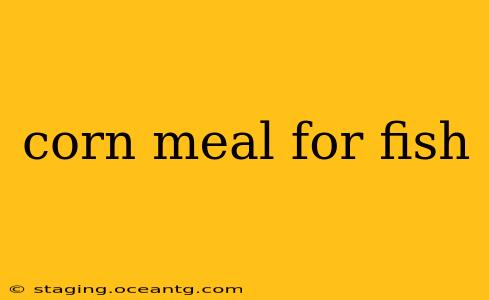Cornmeal, a readily available and affordable ingredient, has sparked interest among fish keepers as a potential food source. However, its suitability for fish diets is a complex topic, requiring careful consideration. This comprehensive guide will explore the benefits, drawbacks, and best practices of using cornmeal for fish. We'll also address some frequently asked questions surrounding this topic.
Is Cornmeal Good for Fish?
The answer isn't a simple yes or no. While cornmeal itself isn't inherently toxic to fish, it shouldn't form the sole component of their diet. Cornmeal is primarily a carbohydrate source, lacking essential nutrients like protein, fats, and vitamins crucial for fish health and growth. Feeding fish exclusively on cornmeal will lead to malnutrition, resulting in stunted growth, weakened immune systems, and increased susceptibility to diseases.
Think of cornmeal as a supplemental ingredient, not a primary food source. It can be used sparingly to add variety and potentially provide a readily digestible energy source, especially for certain species that might benefit from a higher carbohydrate intake. However, always ensure a balanced diet consisting of commercially prepared fish food supplemented with appropriate live or frozen foods.
What Kind of Cornmeal is Best for Fish?
The type of cornmeal matters. Finely ground cornmeal is generally easier for fish to digest compared to coarser varieties. Avoid using cornmeal with added salt, sugar, or other flavorings, as these can be harmful to aquatic life. Plain, finely ground yellow or white cornmeal is the safest option.
Can I Feed My Fish Cornmeal Regularly?
No, you should not feed your fish cornmeal regularly or as their primary food source. As previously mentioned, it lacks essential nutrients. Occasional use, as a very small portion of their overall diet, might be acceptable for some species, but it’s crucial to monitor your fish for any signs of nutritional deficiencies. A varied diet is key to ensuring the health and well-being of your fish.
What are the benefits of feeding cornmeal to fish?
The primary benefit of cornmeal, when used judiciously, lies in its availability and affordability. For certain species with a higher tolerance for carbohydrates, it can offer a readily digestible source of energy. However, this benefit is significantly outweighed by the risks associated with nutritional deficiencies if cornmeal forms a major part of their diet.
Can I feed my goldfish cornmeal?
While goldfish can tolerate small amounts of cornmeal occasionally, it shouldn't be a regular part of their diet. Goldfish require a balanced diet rich in protein and other essential nutrients. Over-reliance on cornmeal will lead to malnutrition and health problems.
Is cornmeal harmful to fish?
Cornmeal itself isn't toxic, but it lacks the essential nutrients required for healthy fish growth and development. Feeding fish a diet predominantly consisting of cornmeal is harmful and will lead to malnutrition and health issues.
What are the risks of feeding cornmeal to fish?
The main risk is malnutrition. A diet lacking protein, fats, vitamins, and minerals will result in stunted growth, weakened immune systems, and increased susceptibility to diseases. This can lead to a decreased lifespan and a lower quality of life for your fish.
Conclusion
While cornmeal might seem like a cheap and easy food option, its limited nutritional value makes it unsuitable as a primary food source for fish. Use it sparingly, if at all, as a very minor supplement to a balanced and nutritious diet that includes commercially produced fish food and other suitable live or frozen options. Prioritizing the well-being of your aquatic companions by providing them with a complete and balanced diet is paramount. Always consult reputable sources and consider the specific dietary needs of your fish species before experimenting with any new food items.
